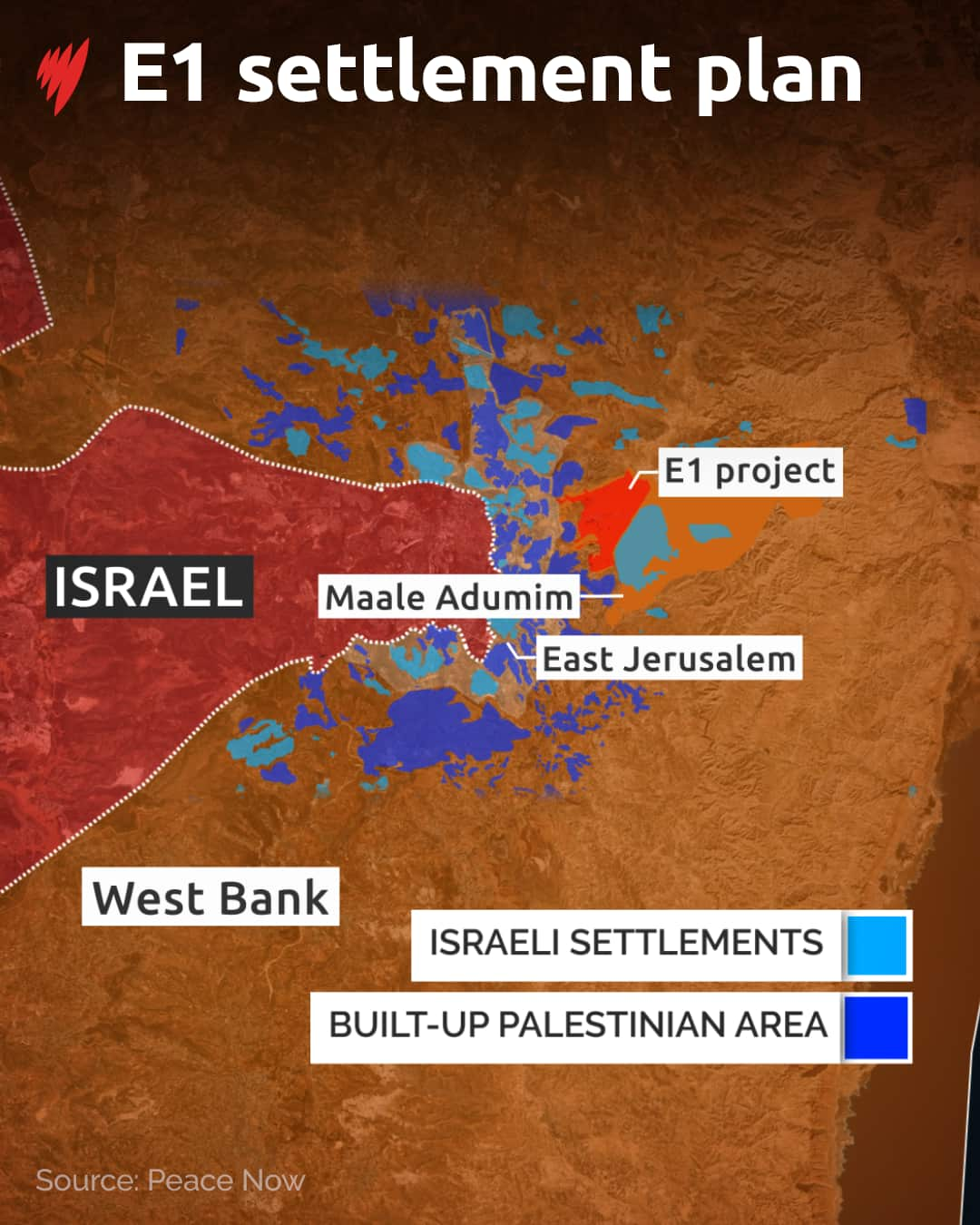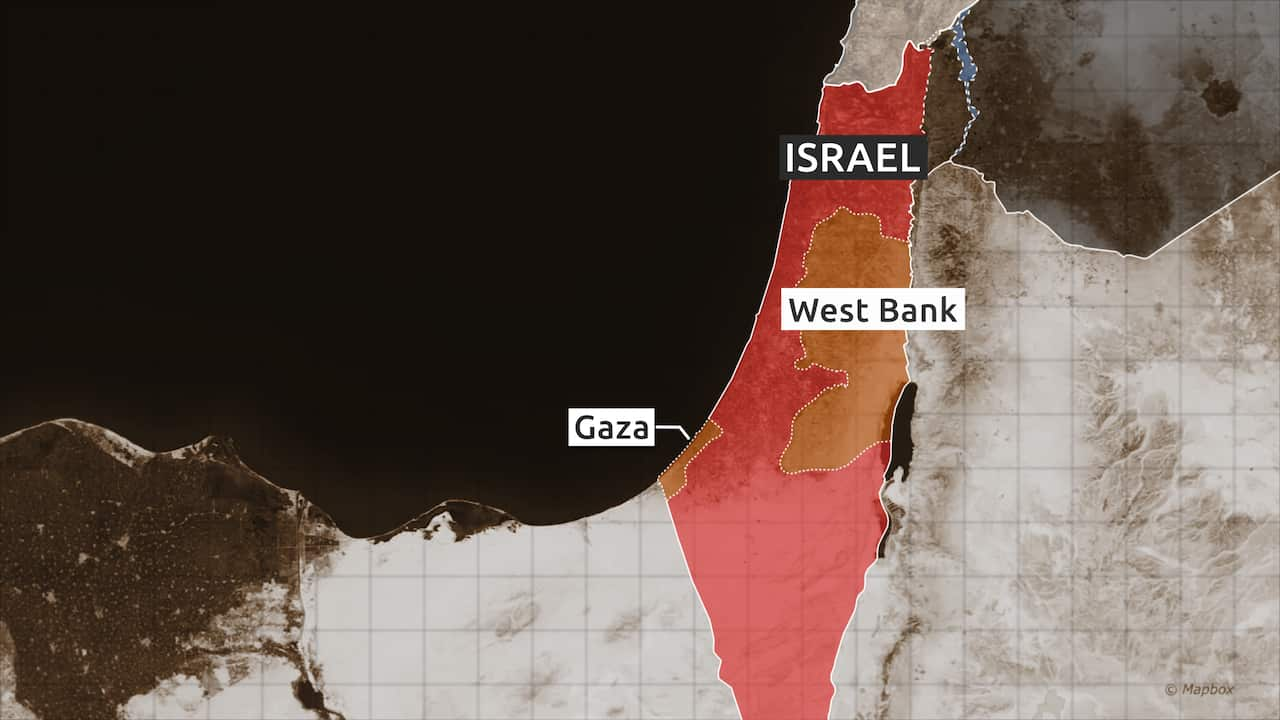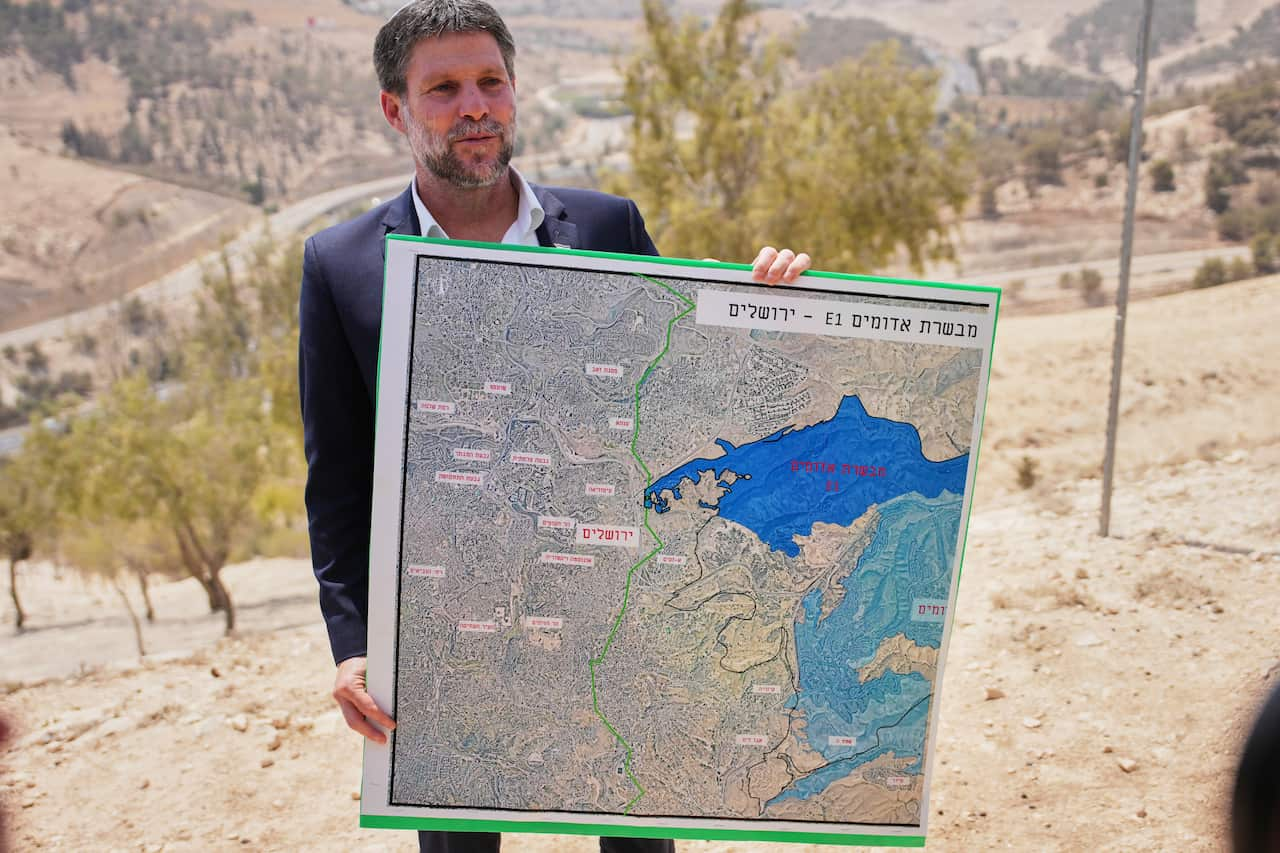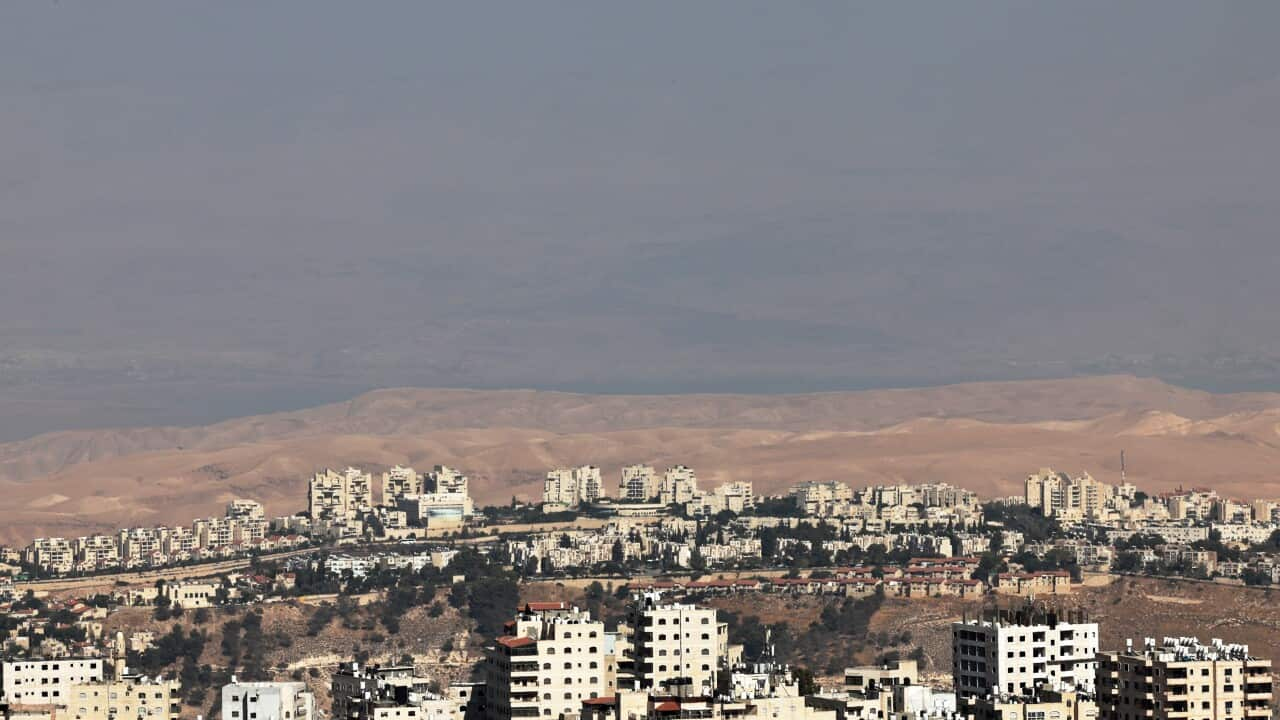Key Points
- Israel has approved a plan to build thousands of units in illegal settlements in the West Bank.
- The plan has faced international outcry describing it as a violation of international law.
- Israel says it is aimed at burying a future Palestinian state.
Israel's approval of a plan to build a controversial settlement in the West Bank has sparked international condemnation, including from Australia, and could threaten the future viability of a Palestinian state.
The decades-old plan known as East1 (E1) was revived by Israel's far-right finance minister, Bezalel Smotrich, at a press conference last week, where he announced the plan "definitively buries the existence of a Palestinian state, simply because there is nothing to recognise and no one to recognise".
Despite international outcry describing the plan as a violation of international law, Israel approved the controversial development on Thursday.
The United Nations considers these settlements illegal under international law, and the Geneva Convention states that an occupying power can't move its civilians to the territory it occupies.
So what is E1, and how would it disrupt Palestinian statehood?
Here's what you need to know.
What is the E1 plan?
East1 (E1) refers to a stretch of land approximately 12 square km in size on the outskirts of Jerusalem in the West Bank.
It sits adjacent to Ma'ale Adumim, where around 40,000 Israelis live in the third-most populous Israeli settlement in the West Bank. Ma'ale Adumim is an illegal settlement under international law, though Israel disputes this.

E1 proposes building more than 3,400 units on the land. The Israel-based NGO Peace Now, which monitors settlement activity in the West Bank, said last week that infrastructure work at E1 could begin within a few months, and housing construction within a year.
A United Nations report found that Israel had expanded its presence in the West Bank since October 2023, with around 700,000 Israeli settlers occupying the territory.
The West Bank and East Jerusalem are also home to 2.7 million Palestinians.
How did the plan originate?
The E1 proposal was first put forward two decades ago in 1994 under former Israeli prime minister Yitzhak Rabin. Since then, there have been several stalled attempts to develop further settlements in the area.

In 2005, construction of E1 was paused after then-US president George Bush intervened, saying the plan was at odds with American foreign policy.
The plan was revived by Israeli Prime Minister Benjamin Netanyahu in 2012, one day after the UN voted to extend non-member status to the State of Palestine. International condemnation put the plans on hold yet again.
Following deadly conflict in the West Bank in 2023, Netanyahu renewed the plans again. That attempt was abandoned following pressure from US secretary of state Antony Blinken under former US president Joe Biden.

Who is behind the latest push?
This time, the plan has been driven by finance minister Bezalel Smotrich.
Smotrich is head of the Religious Zionism party, which holds 14 seats in the Knesset, its legislative chamber. He is known for his ultranationalist stance and said he believes that the West Bank should belong to Israel.
Smotrich has expressed opposition to a ceasefire deal, and in January threatened to quit his position if Israel did not return to fighting in Gaza.
In June, Smotrich was one of two ministers sanctioned by Australia and four other nations for inciting violence against Palestinians in the West Bank.
The sanctions involved travel bans and financial freezes against both Smotrich and national security minister Itamar Ben-Gvir.
In response, Smotrich told the Jerusalem Post that the five countries had made a "grave mistake".
Why is it considered illegal?
All of Israel's settlements in the West Bank, occupied since 1967, are considered illegal under international law, regardless of whether they have Israeli planning permission.
Israel annexed East Jerusalem in a move not recognised by most countries, but has not formally extended sovereignty over the West Bank.
The ruling from the UN's highest court, which is non-binding, found that Israel is obligated to bring an end to its presence in the territory.
Israel disputes this, citing historical and biblical ties to the area it calls Judea and Samaria, and said the settlements provide strategic depth and security.
Most of the global community considers all settlements illegal under international law.
How does E1 'bury' a possible two-state solution?
The longstanding concept of a two-state solution imagines a Palestinian state consisting of East Jerusalem, the West Bank, and Gaza existing alongside Israel.
The land where E1 is proposed would be a crucial land link in any future Palestinian state, providing a connection between the cities of Ramallah to the north and Bethlehem to the south.
The two cities are 22km apart, but Palestinians who travel between the two cities must use a detour that involves Israeli checkpoints, according to B'Tselem, an NGO that monitors restrictions of Palestinians' movements in the West Bank.
The Ramallah-based Palestinian Authority (PA) said that E1 would entrench the division of the occupied West Bank into isolated areas "disconnected from one another, turning them into something akin to real prisons, where movement is only possible through Israeli checkpoints and under the terror of armed settler militias".
"This undermines the chances of implementing the two-state solution, establishing a Palestinian state on the ground, and fragments its geographic and demographic unity," the PA's foreign ministry said in a statement.
Smotrich has said the construction plan is a deliberate attempt to block a two-state solution. In a statement, he said that E1 is finally delivering what has been promised for years: "The Palestinian state is being erased from the table, not with slogans but with actions."
How has the international community responded?
A joint statement condemning the plan was signed by the foreign ministers of 21 countries: Australia, Belgium, Canada, Denmark, Estonia, Finland, France, Iceland, Ireland, Italy, Japan, Latvia, Lithuania, Luxembourg, the Netherlands, Norway, Portugal, Slovenia, Spain, Sweden and the United Kingdom.
The statement, signed by Australia's Foreign Minister Penny Wong and published late on Thursday, called any E1 settlement "unacceptable and a violation of international law".
"It risks undermining security and fuels further violence and instability, taking us further away from peace," the statement said.

"The government of Israel still has an opportunity to stop the E1 plan going any further. We encourage them to urgently retract this plan."
US President Donald Trump has not yet commented publicly on the plans. In the press conference announcing the plan's approval, Smotrich was asked if Netanyahu and Trump had agreed to the plan.
"Of course," Smotrich replied.
— With additional reporting by Reuters and Agence France-Presse.
For the latest from SBS News, download our app and subscribe to our newsletter.

